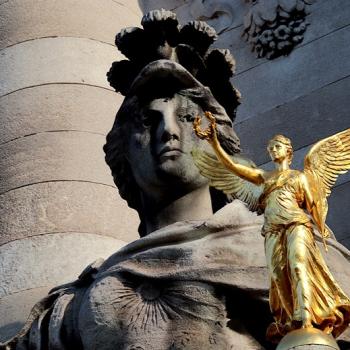
For October I’m focusing on Witches and their stories, and it seems appropriate to begin with Aradia.
Aradia: The Gospel of the Witches (or Vangelo della Streghe) is a strange text, as strange as any scripture any other religion can boast. When recently ill I grabbed it to read between fever dreams, and just like when I read it as a young Witch over a decade ago, I was enchanted and disturbed.
The Gospel, or Vangelo, contains a creation story, a nativity story, worship instructions and stories of miracles attributed to Diana and her aspects and/or relatives. What makes it disturbing are the Christian elements, the whip-and-chair invocations and the seeming justification if not approval of murder based on economic class. I can’t help but compare it to equally disturbing monotheist scriptures and find it a good fit. When you compile it into a checklist of content, that is, but it’s message and the emotive response it evokes is far different.
Regardless of authenticity, the image the Vangelo paints of Diana Soteira, of not merely a loving Goddess but one who acts as a savior of the poor and oppressed is quite moving. Here in the midst of an economic recession, the Vangelo is strangely comforting, the devotion exhibited in the stories very human and the text somehow healing. For years, my favorite story was of Diana feeding the orphans, which I’ve heard in many variations over the years. On re-reading it recently I was struck by a different story. The version I give here is from the Internet Sacred Text Archive copy of Aradia:
There is a peasant’s house at the beginning of the hill or ascent leading to Volterra, and it is called the House of the Wind. Near it there once stood a small place, wherein dwelt a married couple, who had but one child, a daughter, whom they adored. Truly if the child had but a headache, they each had a worse attack from fear.
Little by little the girl grew older, and all the thought of the mother, who was very devout, was that she should become a nun. But the girl did not like this, and declared that she hoped to be married like others. And when looking from her window one day, she saw and heard the birds singing in the vines and among the trees all so merrily, she said to her mother that she hoped some day to have a family of little birds of her own, singing round her in a cheerful nest. At which the mother was so angry that she gave her daughter a cuff. And the young lady wept, but replied with spirit, that if beaten or treated in any such manner, that she would certainly soon find some way to escape and get married, for she had no idea of being made a nun of against her will.
At hearing this the mother was seriously frightened, for she knew the spirit of her child, and was afraid lest the girl already had a lover, and would make a great scandal over the blow; and turning it all over, she thought of an elderly lady of good family, but much reduced, who was famous for her intelligence, learning, and power of persuasion, and she thought, “This will be just the person to induce my daughter to become pious, and fill her head with devotion and make a nun of her.” So she sent for this clever person, who was at once appointed the governess and constant attendant of the young lady, who, instead of quarrelling with her guardian, became devoted to her.
However, everything this world does not go exactly as we would have it, and no one knows what fish or crab may hide under a rock in a river. For it so happened that the governess was not a Catholic at all, as will presently appear, and did not vex her pupil with any threats of a nun’s life, nor even with an approval of it.
It came to pass that the young lady, who was in the habit of lying awake on moonlight nights to hear the nightingales sing, thought she heard her governess in the next room, of which the door was open, rise and go forth on the great balcony. The next night the same thing took place, and rising very softly and unseen, she beheld the lady praying, or at least kneeling in the moonlight, which seemed to her to be very singular conduct, the more so because the lady kneeling uttered words which the younger could not understand, and which certainly formed no part of the Church service.
And being much exercised over the strange occurrence, she at last, with timid excuses, told her governess what she had seen. Then the latter, after a little reflection, first binding her to a secrecy of life and death, for, as she declared, it was a matter of great peril, spoke a follows:–
“I, like thee, was instructed when young by priests to worship an invisible god. But an old woman in whom I had great confidence once said to me, ‘Why worship a deity whom you cannot see, when there is the Moon in all her splendour visible? Worship her. Invoke Diana, the goddess of the Moon, and she will grant your prayers.’ This shalt thou do, obeying the Vangelo, the Gospel of (the Witches and of) Diana, who is Queen of the Fairies and of the Moon.
Now the young lady being persuaded, was converted to the worship of Diana and the Moon, and having prayed with all her heart for a lover (having learned the conjuration to the goddess), 1 was soon rewarded by the attention and devotion of a brave and wealthy cavalier, who was indeed as admirable a suitor as any one could desire. But the mother, who was far more bent on gratifying vindictiveness and cruel vanity than on her daughter’s happiness, was infuriated at this, and when the gentleman came to her, she bade him begone, for her daughter was vowed to become a nun, and a nun she should be or die.
Then the young lady was shut up in a cell in a tower, without even the company of her governess, and put to strong and hard pain, being made to sleep on the stone floor, and would have died of hunger had her mother had her way.
Then in this dire need she prayed to Diana to set her free; when lo! she found the prison door unfastened, and easily escaped. Then having obtained a pilgrim’s dress, she travelled far and wide, teaching and preaching the religion of old times, the religion of Diana, the Queen of the Fairies and of the Moon, the goddess of the poor and the oppressed.
And the fame of her wisdom and beauty went forth over all the land, and people worshipped her, calling her La Bella Pellegrina. At last her mother, hearing of her, was in a greater rage than ever, and, in fine, after much trouble, succeeded in having her again arrested and cast into prison. And then in evil temper indeed she asked her whether she would become a nun; to which she replied that it was not possible, because she had left the Catholic Church and become a worshipper of Diana and of the Moon.
And the end of it was that the mother, regarding her daughter as lost, gave her up to the priests to be put to torture and death, as they did all who would not agree with them or who left their religion.
But the people were not well pleased with this, be cause. they adored her beauty and goodness, and there were few who had not enjoyed her charity.
But by the aid of her lover she obtained, as a last grace, that on the night before she was to be tortured and executed she might, with a guard, go forth into the garden of the palace and pray.
This she did, and standing by the door of the house, which is still there, prayed in the light of the full moon to Diana, that she might be delivered from the dire persecution to which she had been subjected, since even her own parents had willingly given her over to an awful death.
Now her parents and the priests, and all who sought her death, were in the palace watching lest she should escape.
When lo! in answer to her prayer there came a terrible tempest and overwhelming wind, a storm such as man had never seen before, which overthrew and swept away the palace with all who were in it; there was not one stone left upon another, nor one soul alive of all who were there. The gods had replied to the prayer.
The young lady escaped happily with her lover, wedded him, and the house of the peasant where the lady stood is still called La Casa al Vento, or the House of the Wind.
I think anyone who found Witchcraft in their teens can relate to this story. True, it’s a persecution story. All early Witchcraft stories tend to be stories of persecution. Yet they also tend to be stories of rising above oppression, of finding saving grace in a time of need, and of trusting in your own power. If there is a moral, it’s that even in times of extreme adversity, a Witch finds a way and remains true to himself or herself.
The copy of Aradia that comforted me when ill was the recent Weiser edition and I highly recommend it. It’s really lovely, features commentary by Raven Grimassi, Jimal Di Fiosa, Lori Bruno, Paul Huson, Leo Martello, Christopher Penczak, Andrew Theitic and others. It also has an interesting foreword by Robert Mathiesen of Brown University regarding the history of the text, it’s influence and origins that got my wheels spinning. Plus it’s a handy size to keep by the bed or in a totebag for reading, especially for the Hallows season.
*Weiser provided a copy of this book for purposes of review quite awhile back, but that fact has not influenced my review. If it sucked, I would say so.















